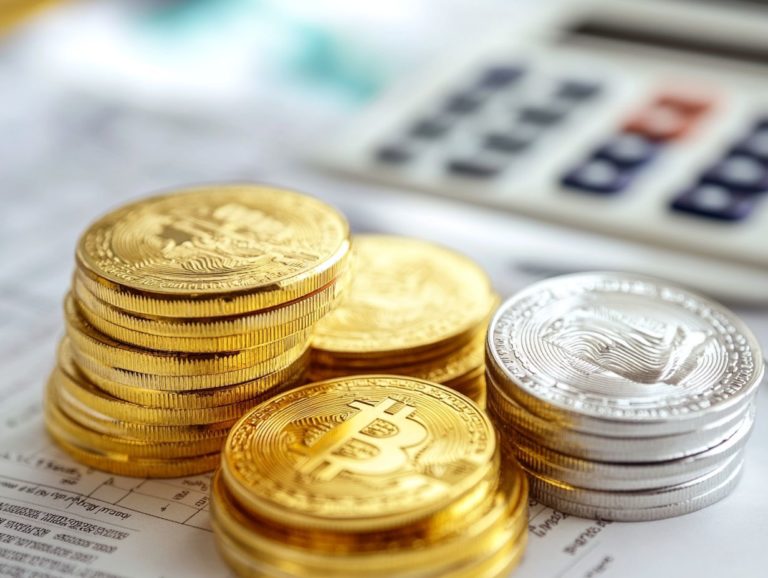Spotting Trends in Precious Metal Investment
Get ready to dive into the fascinating world of precious metals! Investing in these metals has captured the interest of individuals for centuries. They serve as a reliable safeguard against inflation and economic uncertainty.
This article guides you from a clear definition of precious metals to understanding why they remain a wise investment choice today. You ll explore current market trends, popular metals, and various factors influencing their prices.
Effective strategies are provided to help you navigate this investment landscape. This ensures that your decisions are well-informed in a fluctuating market.
Dive in to uncover the enduring appeal of precious metals and discover how to leverage them to your advantage.
Contents
- Key Takeaways:
- Current Trends in Precious Metal Investment
- Factors Affecting Precious Metal Prices
- Strategies for Successful Precious Metal Investment
- Frequently Asked Questions
- What trends should you watch in precious metal investments?
- What factors should I consider when spotting trends in precious metal investment?
- What are some potential risks in precious metal investment?
- How can I stay informed about precious metal trends?
- Are there alternative methods to track precious metal trends?
- What should I do if I notice a trend I want to capitalize on?
Key Takeaways:
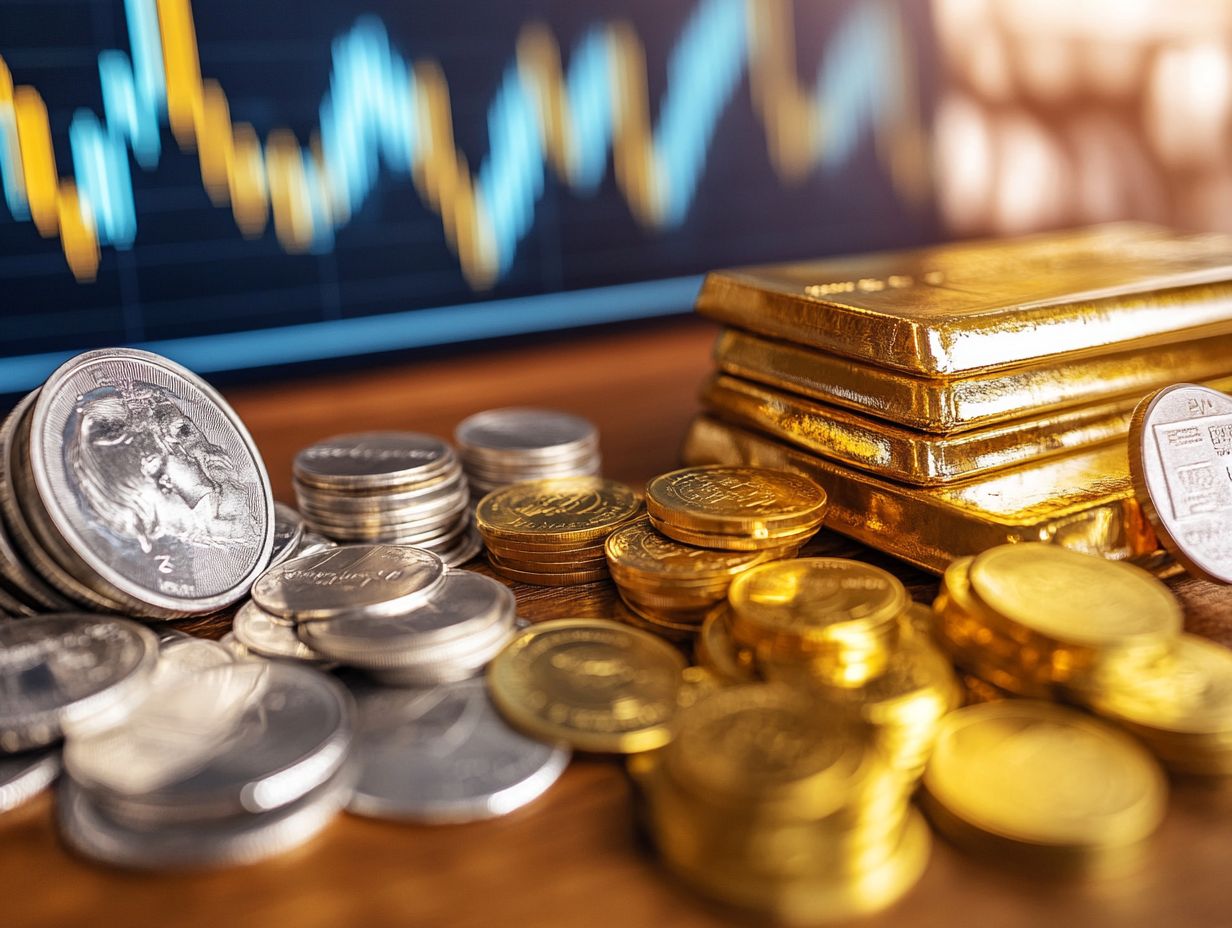
- Diversify your investments by exploring different metals, as each has unique market trends and dynamics.
- Monitor the global economy and political climate, as they greatly affect the demand and supply of precious metals.
- Timing is crucial in precious metal investment. Research and choose the right metals based on market performance and predictions.
What are Precious Metals?
Precious metals are rare, naturally occurring metallic elements with significant economic value. They are highly sought after for various applications, including jewelry, electronics, and investment.
These metals primarily gold, silver, platinum, and palladium carry real value due to their limited supply and high demand in industrial sectors. This shapes their market dynamics and seasonal trends in both Asia Pacific and North America.
Their unique characteristics, such as resistance to corrosion and excellent conductivity, make them irreplaceable in industries like electronics. For example, silver enhances performance in high-tech devices.
Historically, these metals have symbolized wealth, power, and security. They often served as currency or in bartering systems across diverse cultures.
In today’s world, they play a critical role in advancing sustainable technologies. Precious metals act as catalysts in hydrogen fuel cells and components in batteries, showcasing their versatility and enduring significance in modern economies.
Why Invest in Precious Metals?
Investing in precious metals is a savvy strategy for diversifying your portfolio and protecting against inflation and economic volatility. Metals like gold and silver are often seen as safe havens during times of market speculation and geopolitical tensions, making them appealing for those seeking trading opportunities amid uncertainty.
These investments can also act as a buffer against the corrosive effects of rising prices on currency value. They provide a tangible asset that maintains its real value over time.
In economic downturns, assets like gold and silver tend to show remarkable resilience, often outperforming other investment vehicles. You ll appreciate their role as a safeguard against unexpected market crashes, ensuring your wealth isn’t solely tied to the unpredictable performance of stocks or bonds.
By incorporating precious metals into your investment strategy, you cultivate a well-rounded approach that mitigates risks and enhances the overall stability of your portfolio.
Current Trends in Precious Metal Investment
Current trends in precious metal investment reveal a robust market shaped by various factors, including investment demand, seasonal trends, and shifting investor sentiment, making it crucial for investors to focus on spotting trends in precious metal investment.
In recent years, significant growth has been observed across regions, especially in Asia Pacific and North America. Investors increasingly recognize the potential of precious metals to serve as a safe haven during times of economic uncertainty.
Market Performance and Predictions
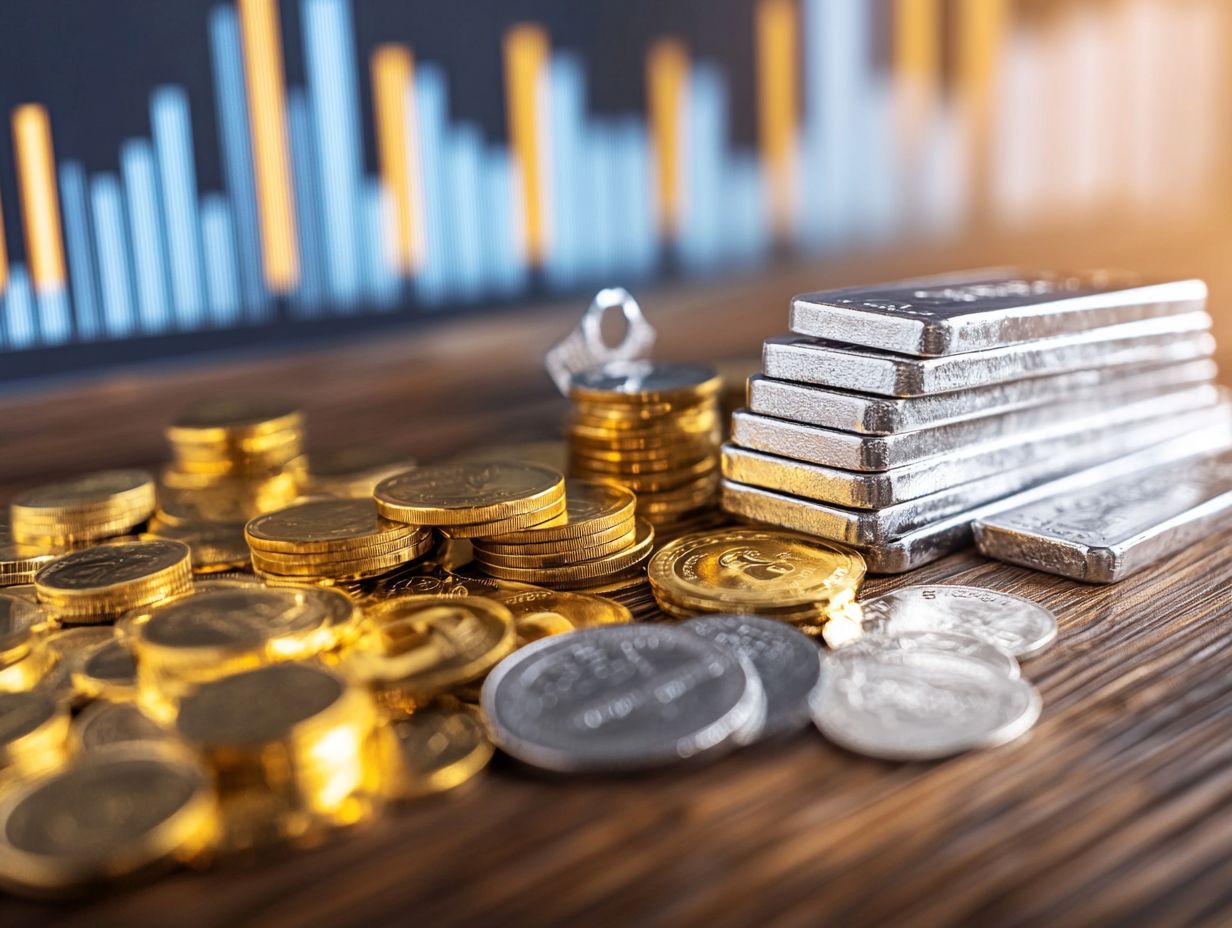
The market performance of precious metals can fluctuate dramatically. Gold, silver, platinum, and palladium prices change in response to evolving economic conditions and geopolitical tensions.
Current analyses suggest that these metals might see increased volatility, presenting both challenges and golden opportunities for you as an investor.
Recent statistics reveal that gold has climbed approximately 5% over the past quarter. This increase reflects its allure as a safe haven amid economic uncertainty.
In contrast, silver has experienced a slight decline, influenced by its industrial applications and shifting demand trends.
As for platinum and palladium, experts indicate that they may remain under pressure due to the varying needs of the automotive industry. Projections hint at a potential rebound if manufacturing picks up steam.
Analysts recommend adopting a diversified strategy. Keep a close eye on geopolitical events, as these factors could further influence precious metals and open up strategic investment opportunities.
Popular Types of Precious Metals
The most sought-after precious metals gold, silver, platinum, and palladium each play distinct roles in the market. They are used in jewelry, electronics, and various industrial applications.
You will find yourself drawn to these metals not just for their beauty but also for their historical significance and potential to appreciate in value.
Gold is often regarded as a safe-haven asset. It retains its allure during times of economic uncertainty, making it a fundamental component of investment portfolios.
In contrast, silver stands out for its versatility. It proves essential not only in manufacturing but also as a tangible asset for savvy investors like you.
Platinum and palladium are gaining traction, especially for their critical applications in the automotive industry. They play a vital role in catalytic converters, devices that reduce harmful emissions, underscoring their importance in sustainability efforts.
This growing demand can spark your interest in their investment potential. Consider diversifying your holdings based on market trends and industrial needs.
Factors Affecting Precious Metal Prices
A multitude of factors influence precious metal prices. The global economy and geopolitical tensions hold important roles in shaping investor sentiment and demand.
Understanding these dynamics is vital for anticipating market fluctuations and making well-informed investment decisions.
Supply dynamics also play a significant role in influencing the price changes of metals like gold, silver, platinum, and palladium.
By grasping this intricate interplay, you will gain the insights necessary to navigate the market effectively.
Global Economy and Political Climate
The global economy and political climate play crucial roles in shaping the investment landscape for precious metals. Fluctuations can significantly influence your sentiment and drive demand.
Events like geopolitical tensions, trade wars, and economic downturns often prompt investors like you to seek out precious metals as a safe haven for your assets.
For example, the recent escalating tensions between major world powers and uncertainties surrounding tariffs have led many to gravitate toward gold and silver. These metals have a historical reputation for retaining value in unstable times.
With inflation rates creeping up in various regions, you will find yourself turning to these metals not only for security but also as a hedge against currency devaluation.
Recent surges in demand are tied to market reactions to central bank policies. This prompts many to consider these assets for diversifying portfolios amid fluctuating stock markets.
Demand and Supply Dynamics
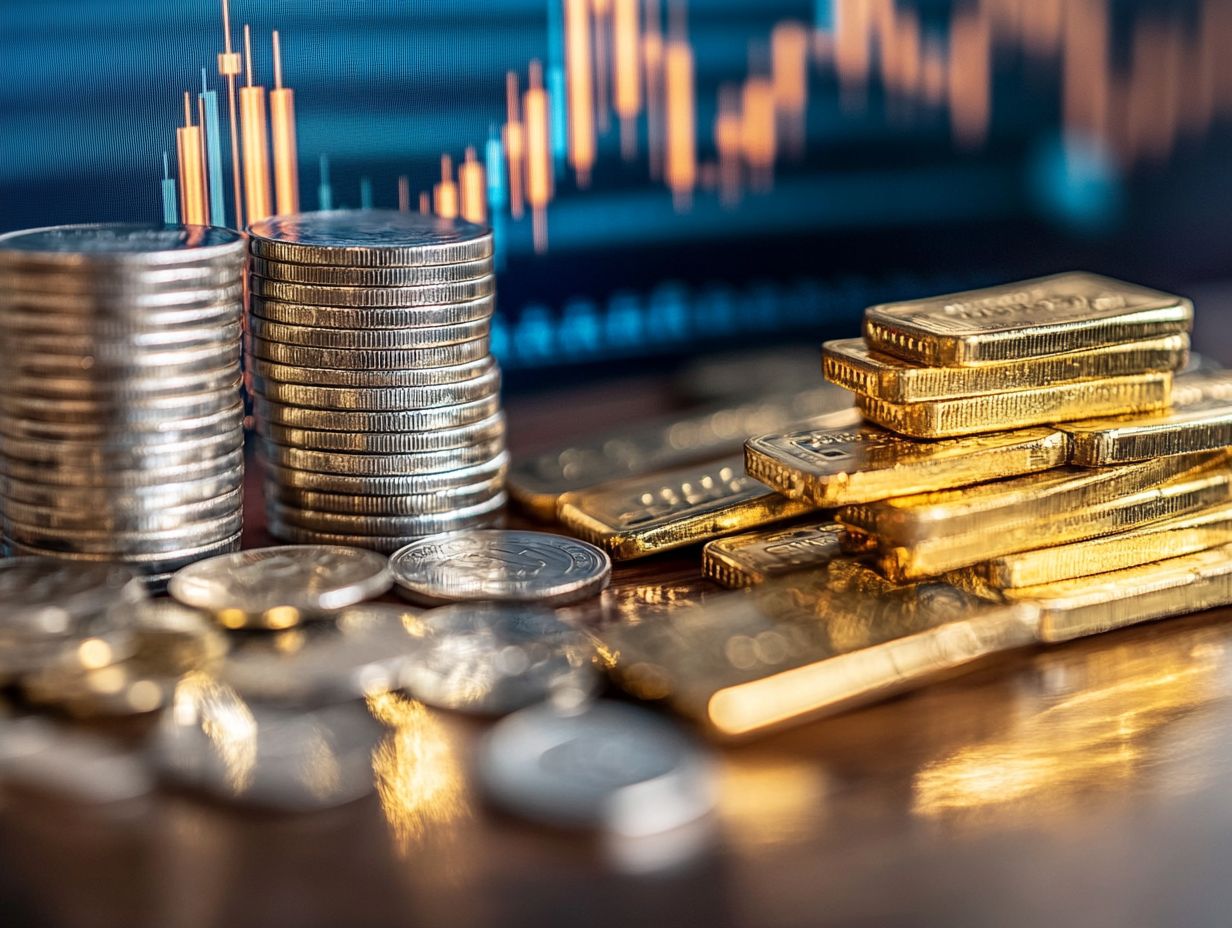
Understanding the dynamics of demand and supply is essential for grasping precious metal prices. As economic conditions shift, both opportunities and challenges arise for traders.
Industrial applications and investment demand significantly affect supply. Geopolitical tensions, currency shifts, and mining production changes can influence market sentiment.
For example, when tensions rise in key mining regions, supply may become restricted. Conversely, advancements in technology could enhance extraction methods, affecting output levels.
The allure of precious metals like gold and silver often surges during times of economic uncertainty, attracting both investors and speculators, leading to fluctuations in demand.
These interconnected elements shape your trading strategies and serve as critical indicators of market trends, nudging you to adapt your approach to maximize potential gains.
Strategies for Successful Precious Metal Investment
Successfully investing in precious metals requires effective strategies with a thoughtful emphasis on diversification and risk management.
These elements are crucial for managing the intricate landscape of fluctuating economic conditions. Stay vigilant in recognizing trading opportunities that emerge from market trends and ensure your investments align with your long-term financial goals.
Diversification and Risk Management
Diversification is a cornerstone principle of investment, serving as a vital strategy to mitigate risk.
In the fascinating world of precious metals, this means spreading your investments across various assets like gold, silver, platinum, and palladium. Effective risk management strategies help you navigate the inherent volatility of trading in this sector.
By distributing your holdings among these different metals, you position yourself to optimize returns while shielding against fluctuations in any single market. For instance, while gold often acts as a reliable way to protect your money during tough times, silver may thrive amid rising industrial demand.
Regularly adjusting your portfolio in response to market trends is wise. Utilizing tools such as stop-loss orders is crucial for protecting yourself against unexpected downturns.
Incorporating exchange-traded funds (ETFs), which are investment funds traded on stock exchanges, can streamline your diversification efforts. This enhances your confidence in achieving long-term financial stability.
Timing and Choosing the Right Metals
Timing and selecting the right precious metals is essential for optimizing your investment returns. Understanding what criteria to use for precious metals investment can help. Market speculation and investment demand can significantly influence metal prices. Stay informed about market trends, geopolitical tensions, and economic conditions to make well-informed decisions on which metals to invest in.
Understanding the cyclical nature of these markets allows you to identify entry and exit strategies that align with both short-term fluctuations and long-term trends. During periods of economic uncertainty, precious metals often serve as safe-haven assets, highlighting the importance of research in precious metal investing for astute investors like yourself to allocate resources accordingly.
Knowing the intrinsic properties and market positions of individual metals such as gold, silver, and platinum enables you to diversify your portfolio effectively. By employing analytical tools and market forecasts, you can enhance your decision-making process, ensuring you maximize potential gains while mitigating risks associated with price volatility.
Frequently Asked Questions
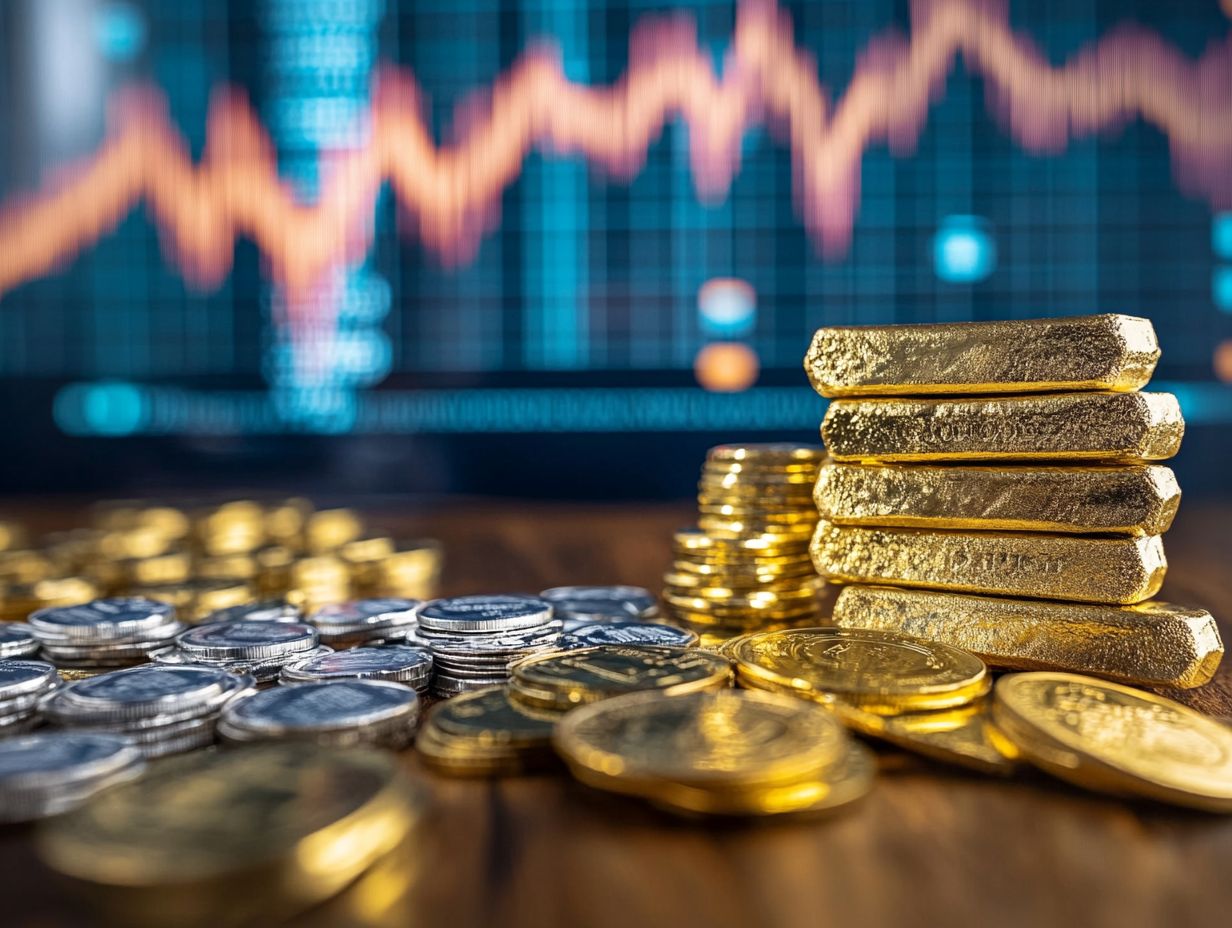
What trends should you watch in precious metal investments?
Common trends include an increase in demand for physical metals, a rise in prices during times of economic uncertainty, and understanding precious metal market cycles as the popularity of digital gold investments grows.
What factors should I consider when spotting trends in precious metal investment?
Consider global economic conditions, market demand, supply levels, and political events when spotting trends.
What are some potential risks in precious metal investment?
One risk is that trends may not be reliable indicators of future market movements. They can change suddenly, leading to potential losses for investors.
How can I stay informed about precious metal trends?
To stay updated, regularly check financial news and market analysis from trusted sources. Consulting a financial advisor or joining online metal investment communities can also help.
Are there alternative methods to track precious metal trends?
You can look at price patterns to predict market movements or examine economic factors to assess a metal’s value.
What should I do if I notice a trend I want to capitalize on?
If you see a trend, research thoroughly before making investment decisions. Consider diversifying your portfolio to lower your risk.



